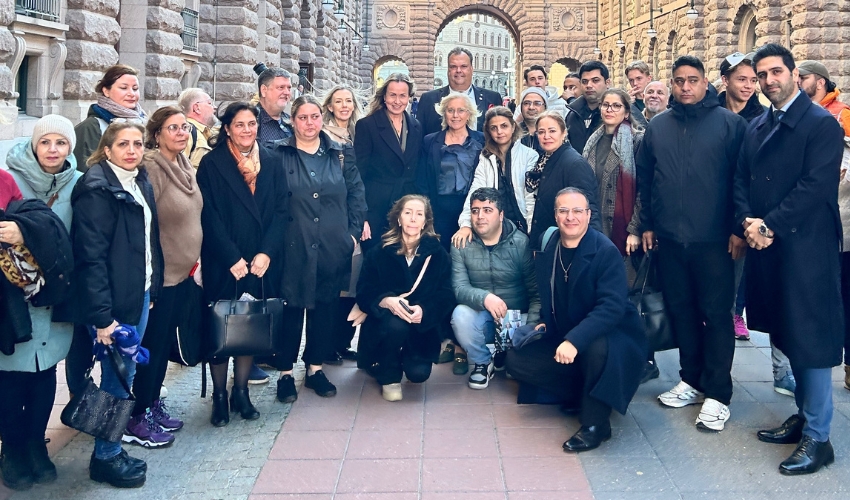
Iranian Christian converts were invited to join a meeting in the Swedish parliament in October following the publication of a report that highlighted persistent concerns with the country’s immigration practices. (Photo: Skandinaviska Människorättsadvokaterna AB)
By Fred Petrossian
The UN Committee Against Torture has four times found Sweden guilty of violation its convention for its decisions to deport Christian converts, underscoring persistent concerns about the country’s immigration practices.
Such decisions, widely criticised by civil rights organisations, expose systemic flaws within Sweden’s migration system.
A recent report by a Swedish government institution scrutinised the Migration Agency’s decision-making process regarding converts, as well as members of the LGBT community, revealing significant legal and procedural shortcomings.
The report, published by Statskontoret (The Swedish Agency for Public Management) in October, renewed focus on a long-standing issue previously highlighted by organisations such as the Swedish law firm Skandinaviska Människorättsadvokaterna AB, and Farr, an umbrella group for asylum-rights defenders.
Meanwhile, Iranian Christian converts have protested their mistreatment for years through sit-ins and public demonstrations across Sweden.
Government oversight and findings
The October report came in response to mounting criticism, as the Swedish government tasked the supervisory institution with investigating the Migration Agency’s practices, particularly concerning asylum cases involving converts and LGBT individuals.
The institution analysed 45,000 Immigration Court decisions from 2020 to 2023, releasing a detailed report that identified systemic inconsistencies and legal uncertainties.
Having “analysed the extent to which the Swedish Migration Board’s assessments of asylum cases are uniform and legally secure”, the report concluded that “there are several signs that uniformity is lacking in a way that could affect legal certainty”.
Michael Williams, a representative of Farr, highlighted the opaqueness of migration decisions to Article18:
“The decisions at the Migration Agency are confidential and not accessible to the general public. Court decisions, while available upon request, are often anonymised and exclude sensitive reasoning, such as medical reports.”
Williams also pointed to limitations in the report – “the investigators … had no expertise in asylum law and did not examine individual cases” – but said they had interviewed staff and stakeholders “knowledgeable about conversion cases”.
“Their findings, though not exhaustive, revealed serious flaws,” he said.
Key issues identified in the report included:
Regional disparities: Approval and rejection rates for asylum cases vary significantly across regions, without apparent explanations based on background or legislative discretion.
Inconsistent decisions: Migration courts differ in how often they overturn or refer decisions by the Migration Agency, with no clear, data-driven explanations for the disparities.
Weak governance: Inadequate internal governance and follow-up mechanisms within the Migration Agency undermine the legal quality and uniformity of asylum assessments.
Shortcomings and violations of international conventions
“When authorities make decisions, they should base these on clear and transparent guidelines and legal provisions,” Rebecca Ahlstrand from Skandinaviska Människorättsadvokaterna AB told Article18. “Legal certainty means that the exercise of authority adheres to international conventions, constitutional laws, and other provisions, offering individuals protection against arbitrary intervention by the state.
“These are serious problems. We have addressed hundreds of individual cases and escalated 50–60 cases to the UN Committee Against Torture and the European Court of Human Rights [ECHR]. While progress has been made, Sweden’s migration proceedings still lack legal certainty.”
Repeated violations of the UN Convention Against Torture have brought international condemnation. The latest case, adopted by the Committee in November, involved a family of Christian converts from Afghanistan who were judged to be facing a credible risk of torture if deported.
Discussion in parliament
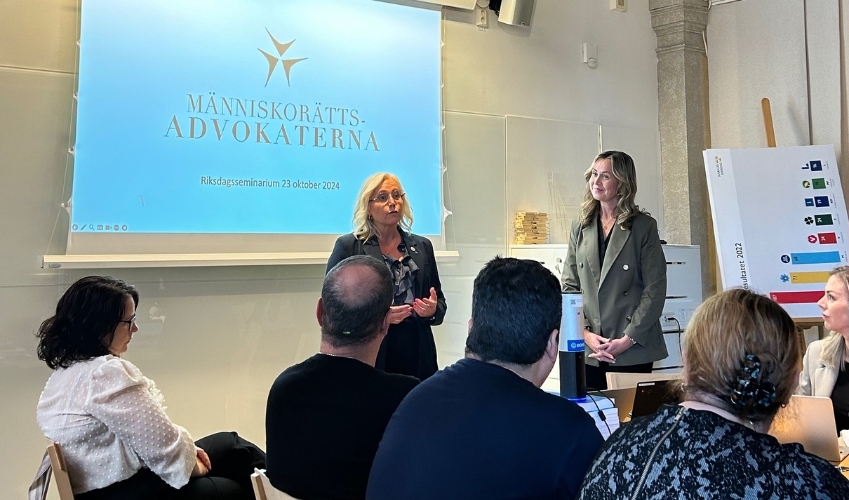
Ruth Nordstrom (right) AB underscored several critical issues in her presentation: (Photo: Skandinaviska Människorättsadvokaterna AB)
Two weeks after the publication of the report, on 23 October, a session in the Swedish parliament brought together civil society organisations, Iranian Christians, and other stakeholders to discuss the findings.
The two-hour discussion focused on shortcomings in Sweden’s asylum process, particularly in cases involving Christian converts.
The meeting, convened by Sweden’s KD (Christian Democrats) and C (Centre) parties, focused on addressing key concerns.
In her presentation, Ruth Nordstrom from Skandinaviska Människorättsadvokaterna AB underscored several critical issues:
Risk of persecution: Christian converts face severe threats – including torture, inhumane treatment and execution – upon deportation to their home countries.
Complaints to the UN: More than 50 complaints highlighting flaws in the asylum process have been filed with the UN Human Rights Committee and the Committee Against Torture.
Reports of shortcomings: Findings from the Statskontoret report and UNHCR documents expose significant inconsistencies and deficiencies in asylum decision-making.
Regional disparities: Rejection rates for asylum applications vary starkly between Migration Agency offices—44% in Jönköping compared to 80% in Gothenburg.
Political influence: Judicial decisions are heavily influenced by judges’ political affiliations, with SD (Sweden Democrats) party judges rejecting 93% of cases compared to 15% in the case of C party judges.
Legal insecurity: The asylum process for Christian converts remains fraught with inconsistencies, underscoring the urgent need for reform.
Supporting Iranian Christian converts
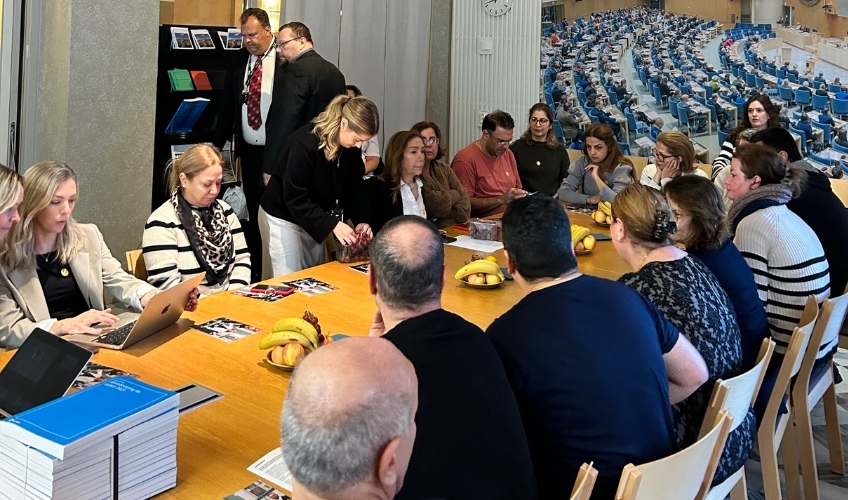
Photo: Skandinaviska Människorättsadvokaterna AB
Michael Williams of Farr shared key recommendations for better supporting asylum-seekers, including:
Clear initial guidance: Asylum-seekers should receive comprehensive information on the procedure, such as guidance outlined in Farr’s publication on religious persecution cases.
Experienced legal representation: Lawyers with expertise in asylum and conversion cases should be sought.
Interview preparation: Asylum-seekers should be educated about typical interview questions and effective strategies to articulate their claims.
Church documentation: Churches should provide detailed certificates chronicling the convert’s faith journey and religious commitment.
Improved communication: Asylum-seekers should be assisted in effectively conveying their experiences, beliefs, and risks in their home country.
Up-to-date country information: The latest country-specific reports should be used to support claims of persecution.
Williams emphasised the limitations for those who have exhausted the appeals process, saying:
“For those who have received a final negative decision in the basic asylum procedure, a full case reconsideration is nearly impossible unless a lawyer is willing to escalate the matter to the ECHR or a UN Committee, and the case meets admissibility criteria. For others, the only recourse is submitting a subsequent application, but this requires presenting new circumstances to justify an impediment to expulsion.”
Legal precedents
The Grand Chamber of the ECHR issued a pivotal ruling in March 2016, in the case of F.G. v. Sweden (no. 43611/11), addressing Sweden’s refusal of asylum to an Iranian Muslim who had converted to Christianity, unanimously determining that European countries cannot deport an asylum-seeker to Iran without fully assessing the risks posed by their religious conversion.
Emeritus Professor of International Law, Said Mahmoudi, explained to Article18:
“Regarding conversion to Christianity, the court mandates that relevant authorities, such as the Court of Appeal or the Supreme Court, consider all new facts that were unavailable during earlier assessments. This requirement is particularly critical as Swedish migration appellate courts often rely heavily on the findings of lower courts or administrative officials.”
This landmark ruling underscored the obligation to conduct a thorough, impartial evaluation of risks, particularly in cases involving religious conversion, and highlighted the need for Sweden to align its practices with international legal standards.
Campaigns and protests
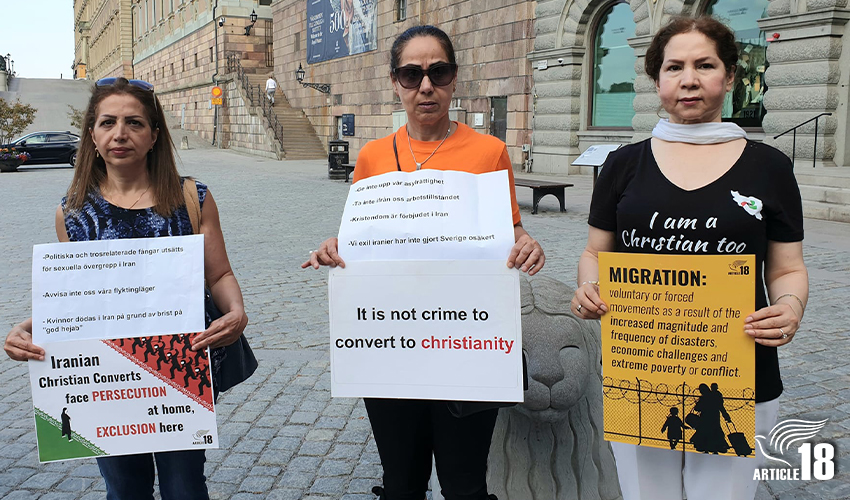
The “I Am A Christian Too” campaign has held regular demonstrations in Sweden over the last five years.
Iranian Christian converts have launched advocacy campaigns to raise awareness of their plight. The “I Am A Christian Too” campaign, initiated in 2020, aims to secure refugee status for Iranian converts, as well as highlighting human rights abuses in Iran.
Amir Hossein Jaafari, the leader of the campaign, who attended the parliamentary meeting, told Article18 previously: “We want to raise awareness and ask the Swedish government and international human rights community to make the Iranian State accountable for rights violations of religious minorities, and particularly Iranian Christian converts.”
Another Christian activist, Mehdi Farshbaf Azarian, has staged sit-ins at migration offices, demanding justice and adherence to international conventions for Christian converts and asylum-seeking political prisoners.
“My wife and I are demanding justice for the 13 years of our lives taken by the Swedish Immigration Service,” he told Article18. “We are advocating for justice for Iranian Christians like me, whose rights have been violated by the Migration Office.”
He further suggested filing formal complaints against the Migration Office for its violations of international conventions, emphasising the need for systemic reform and accountability.
Next steps
The next parliamentary discussion on the situation of Christian converts is scheduled for three weeks’ time, on 7 February. Advocates remain hopeful of meaningful reforms in Sweden’s asylum process.

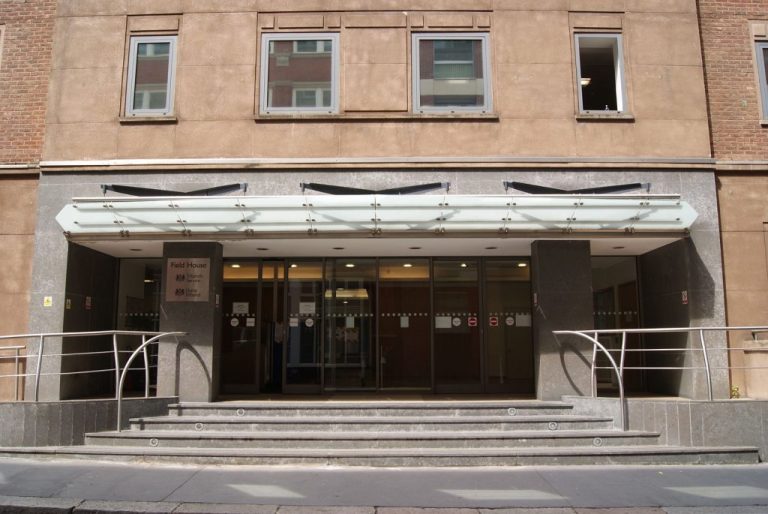
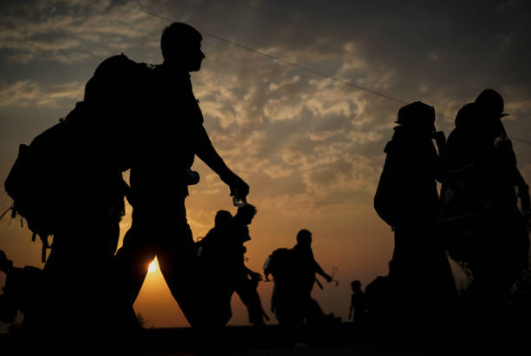
0 Comments
Trackbacks/Pingbacks